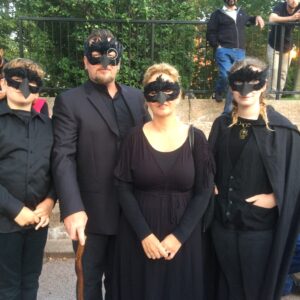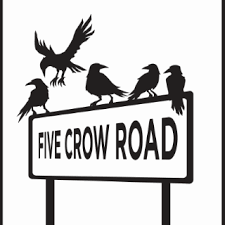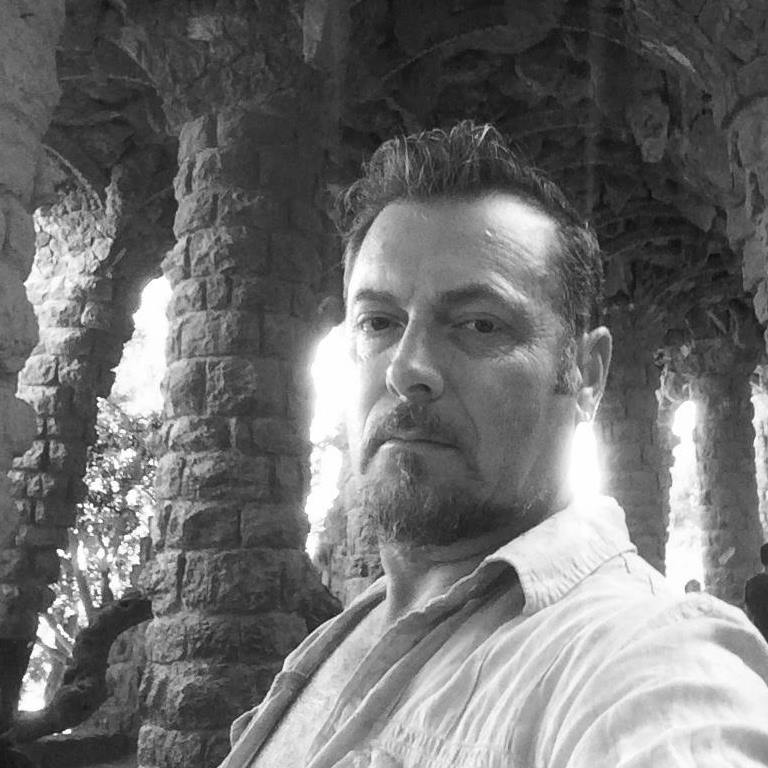I never wanted to be a writer. I wasn’t one of those heady young people with a sticker covered notebook of brilliant story ideas and Dali-esqe doodles. I didn’t dream of someday writing a great novel that would change the world and make me famous all over the globe. I wasn’t one of those kids, but I eventually married one.
I was the unassuming, closeted nerd hoping no one would notice my fixation with comic books, sci-fi adventure, and weird music. I always loved great character-driven, end of the world-type stories, but I never expected to write them. I did dream of being a filmmaker for a while in high school, probably because I was getting my first taste of drama clubs and high-school theatre, which gave me my first opportunity to stand out, feel empowered, and see how a production could come together with perseverance and hard work. I thought I had a critical eye with my lifetime of naively studying the great films of the 80’s, so therefore I could make movies. I didn’t know where the stories would come from, but I knew I could recognise a good one when I saw it.
Then life happened, as it does to most. I found various jobs, shared crummy, laugh-filled apartments with smoke-stained walls. I went to university to find myself and slowly did, again never feeling like the kind of guy who could write a novel. It just wasn’t on my radar at all. But I always maintained that critical eye and love of adventure stories. Comic books and Star Trek were my jam, and I was no longer embarrassed by being a nerd. Instead, I relished it and celebrated it with my new nerd brothers and sisters that university had brought into my life.
In university I met that wannabe writer girl I mentioned earlier. She was beautiful, interesting, and well-read in the classics. She was going to be a writer someday and everyone knew it. She’d tell you soon after you’d met her. We fell in love, and like romantic fools we headed off back-packing around Europe, North Africa, and the Middle East to see how tough we were and if this relationship would break. It didn’t. In fact, it grew stronger and stronger. Long days walking from one Greek village to the next, soaking in the beauty of it all, we’d tell each other the stories we knew. For her part, she’d tell me the long form overviews of the works of authors like Jane Austen and Graham Greene. For my part, I would try to explain in some sort of chronological order the histories of the X-Men, Spider-Man or UFO’s. I could go on for days, weeks even. She loved it, and she still does, I think. I didn’t see it then, but I can see it now. A key part of our relationship has been built on the telling of stories…
Now, fast-forward 25 years an d two kids later, life kept happening to both of us. She still hadn’t written her novel yet and we were focused on careers and child raising; but one fate-filled day driving and talking with my daughter and her friend, an idea was born. You see, our daughter is truly a combination of the best and most interesting traits my wife and me. She’s smart and earnest, interesting and unique. At this point in her life, she was inheriting my love of the weirder side of things and was diving deep into the X-Files on Netflix and simultaneously watching a lot of the Murdoch Mysteries on the good ol’ CBC. Most people know what the X-Files is, but many may not know Murdoch. The Murdoch Mysteries, based on the novels by Maureen Jennings, follows the murder investigations of William Murdoch, a turn of the century policeman in Toronto. Truth be told, I’m not the show’s biggest fan, but what I really appreciate about the program is how well they weave actual historical characters into the story and how Detective Murdoch is always on the cutting edge of radical new forensic sciences like fingerprinting, blood splatter, and whatnot.
d two kids later, life kept happening to both of us. She still hadn’t written her novel yet and we were focused on careers and child raising; but one fate-filled day driving and talking with my daughter and her friend, an idea was born. You see, our daughter is truly a combination of the best and most interesting traits my wife and me. She’s smart and earnest, interesting and unique. At this point in her life, she was inheriting my love of the weirder side of things and was diving deep into the X-Files on Netflix and simultaneously watching a lot of the Murdoch Mysteries on the good ol’ CBC. Most people know what the X-Files is, but many may not know Murdoch. The Murdoch Mysteries, based on the novels by Maureen Jennings, follows the murder investigations of William Murdoch, a turn of the century policeman in Toronto. Truth be told, I’m not the show’s biggest fan, but what I really appreciate about the program is how well they weave actual historical characters into the story and how Detective Murdoch is always on the cutting edge of radical new forensic sciences like fingerprinting, blood splatter, and whatnot.
As we drove along, explaining to my daughter’s friend the oddball taste in television viewing in our home, I asserted how awesome it would be if someone took these favourite parts of our shows and combined them. “Wouldn’t it be amazing if someone did a show about a turn of the century paranormal investigator examining all the classic supernatural tropes but utilizing fringey cutting edge technology available at the time? What if you took someone like Charles Fort, the world’s first real paranormal investigator, and told a grand story about his secret life, out in the field examining everything from cryptids to UFO’s, all the while discovering a sweeping ancient conspiracy that has the world in its thrall.”
Well, the seed was planted and took hold fast. Immediately my daughter and I were batting back and forth story ideas and characters that would be fantastic to see, all while this other poor girl from a normal family sat there nodding with very little idea about what we were speaking about and who these characters were. We wanted a monster-of-the-week show but with a great and unfolding back story and charming, flawed characters. We wanted it to be grounded in history yet fantastical, scary yet light-hearted, full of monstrous threats and bizarre science.
Eventually the drive was over but the ideas lived on in my head. I couldn’t stop thinking about it. I felt I could even see it. The characters, the relationships, the era, the mission, the steampunk patina and flavour, and of course, the paranormal cases.
As the months went by, I couldn’t stop thinking about it and the elements I wanted to add. I started keeping a notebook, jotting down every esoteric idea I wanted to explore further and later. But then after three months of taking notes, I started to ask myself what was I doing with this? I realized that if I wanted to see this TV show, the first thing I had to do was write a screenplay. I took an online course and bought some software and started hammering out the pilot, which was by this time, pretty well fleshed out in my mind. It was weird. Here I was writing — I mean seriously writing — something for the first time in 25 years! But it was flowing. My wife was supportive and that meant a lot. Having her feel like I wasn’t wasting my time and that the ideas were good gave me enough steam to keep at it. Revisions and editing, editing and revisions, on and on the cycle went until finally one day I had a pretty polished screenplay. I sent it off for some professional criticisms and got back good feedback. “Fix this. More of that. But the core idea is great.” And the more people I shared my work with, the more I kept hearing it. “The core of this idea is great. It’s got a lot of potential.” I entered it in a few competitions and it fared pretty well, even making the top ten in one big one. ![]()
I had plotted a couple of seasons of story arc and got to work on a second episode when it struck me, “What if someone wanted to make this show? What if they wanted to option it? What would I do?” I was so in love with the world I was creating that I was nervous about ever letting it go. If someone even offered me a modest amount of money, how could I say no? Would I end up losing control? Would I ever get to tell the long story I’d dreamt up? Would the relationships I created ever get to be truly explored and would they resolve as I intended?
As this existential breakdown played out in my mind over time, I realized that I didn’t want to let it go. I wanted to tell this story and see it through to the end. My wife believed in it and wanted to help, so we decided to make the leap and try co-writing a novel together. The notion both excited and scared me. Did I mention we’re both Aries? Was I risking my marriage to explore some vanity project that would never even see the light of day? Maybe…
It took a little time to come up with a process that exercised both our writing strengths, but we found it and we were getting good results. We definitely had some tough debates and it is hard to convince a fellow writer that one’s ideas may be better than the others. But it was debate and arguing for what you believe in that was making the book better and stronger. If we couldn’t convince the other of a good idea, then maybe it wasn’t that good. If you wanted to fight to keep a word or a sentence just ‘so’, then you’d better be able to make the case.
For us, collaboration proved to be a godsend. I also understand why it wouldn’t work for everyone or every project. We were able to combine our shared love of telling stories and to truly appreciate each other’s strengths. It added a whole new dynamic to our marriage as well, which has been really rewarding as a long-term married couple. We explore ideas in new ways, we travel around to various writer events, conventions and book signings. It’s given us something new to grow together with, especially important now as our children are well into their teens.
Collaboration was our key to success, but so was determination, passion, and compromise. I wanted these stories to be told. I wanted the world to be able to see my vision. Never giving up and finding a path forward go hand in hand. If you really want to tell your story, hold on to your passion, don’t be in a rush, and find the path forward. It’s there, you just may not be able to see it yet. You may wander down the wrong path a bit, but if you are determined to reach your destination, you’ll get there. Just don’t give up.




